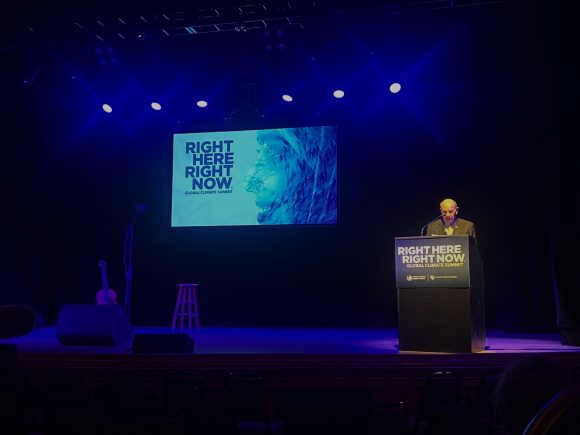
University of Colorado Boulder Chancellor Philip DiStefano speaks at the welcome reception for the Right Here, Right Now Global Climate Summit on Thursday, Dec. 1, 2022. (Jessi Sachs/CU Independent)
The University of Colorado Boulder and the United Nations Human Rights cohosted the Right Here, Right Now Global Climate Summit on Dec. 1-4, a conference highlighting the relationship between climate change and human rights. Panelists from all over the world spoke about the impacts of climate change and potential solutions.
Here’s a recap of some of the panels throughout the summit.
The disproportionate impacts of climate change
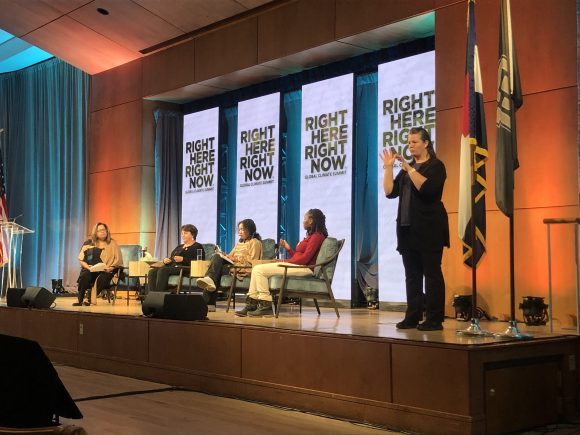
Lakshmi Singh discusses climate change with Nahla Haidar, Selina Leem, and Hilda Flavia Nakabuye at the UMC on Friday, Dec. 2. (Ann Marie Vanderveen/CU Independent)
On Friday, Dec. 2, the Right Here, Right Now Global Climate Summit hosted a panel titled “The experiences of those whose human rights are disproportionately impacted by climate change.”
The moderator, NPR anchor Lakshmi Singh, interviewed panelists Mattias Åhrén, a lawyer and professor from an indigenous reindeer herding community in Sweden; Nahla Haidar, a vice chairperson on the UN Committee on the Elimination of Discrimination against Women from Lebanon; Selina Leem, a youth activist from the Marshall Islands and Hilda Flavia Nakabuye, a youth activist from Uganda.
Several panelists discussed their personal encounters with the effects of climate change.
“Our country is two meters above sea level,” Leem, who also spoke at a protest encouraging CU to divest from fossil fuels on Friday, said. “So growing up in the Marshall Islands, it’s not a choice that you have to be involved or be aware of the climate crisis.”
The reduction of natural resources due to climate change and other issues resulting from human activity is a part of this problem.
“Nature in its original form is not a natural resource,” Åhrén said. “Nature becomes a resource only when viewed through the eyes of a particular culture of people.”
The views that more wealthy nations have towards natural resources have created various inequalities, according to the panelists. The world’s richest countries make up 16% of the global population while accounting for nearly 40% of carbon dioxide emissions, according to the International Monetary Fund.
Nakabuye said when looking towards solutions, these views must change.
“The same systems that brought about the challenge we are facing today cannot be the same systems that will put us out of this challenge,” said Nakabuye.
Nakabuye also spoke about the CU Boulder university system’s investment in fossil fuels.
“CU Boulder has scientific research that shows that climate change is a very big challenge, but there are still investments in fossil fuels,” Nakabuye said.
Several audience members clapped, including a few clad in bright orange who had protested this issue earlier in the day.
Haidar said these issues cannot get in the way of working together to find a solution.
“I don’t think it’s about not working with those who have caused the situation. It’s about how we bring those who have caused — because of ignorance, of lack of knowledge. We bring them the knowledge, and we make them aware so that we call on them also to change,” Haidar said in a later interview.
To bring about change, the majority of the panelists said representation was part of the solution. Leem said that this means making those who are more privileged and distanced from the impacts of climate change aware of the current situation.
“I think one of the most detrimental things is when people talk about climate change as if it’s in the future,” Leem said. “That could be as simple as [saying] ‘Oh, there are people who are going to be affected,’ when it should be ‘There are people who are already being affected by the impacts of the climate crisis.’”
Climate change education
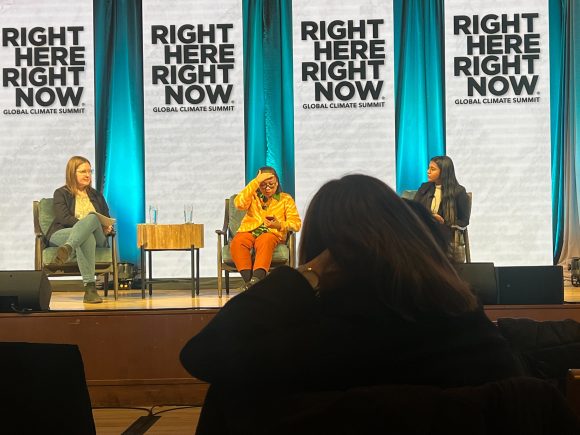
Moderator Megan O’Toole and panelists Ili Nadiah Dzulfakar and Gitanjali Rao discuss education reform at the climate summit on Saturday, Dec. 3, 2022. (Jessi Sachs/CU Independent)
On Dec. 3, the summit focused on the term “obligation.” The panel, “Education’s role: knowledge and inquiry about human rights and climate change,” focused on encouraging audience members educate themselves and others on climate change.
“Learning is a lifelong process. You don’t have to learn from classrooms, and it is never too late,” said panelist Ili Nadiah Dzulfakar, the chair and program director for Klima Action Malaysia.
The panelists said that climate education and action are necessary for all, regardless of age, gender or other demographics. The panelists all discussed the idea of marginalized groups “taking a seat at the table” of climate change discussion.
One panelist and youth science prodigy, Gitanjali Rao, a member of the Forbes 30-under-30 list, discussed her hopes for the future of STEM-based climate action.
“[In the future] there is going to be no such thing as ‘young people in STEM,’ no such thing as ‘women in STEM,’” Rao said.
CU Boulder alum Ann Toll, who attended the summit, said the panelists’ urge for youth to participate in climate action was especially impactful.
“I knew, because I’ve raised three young people in the Boulder community, how limiting it feels to be young and have good ideas and have the energy and a sense of urgency about something. To be discounted and told ‘Oh, you’re too young’ or ‘Oh, you don’t know enough,’” Toll said.
Panelist Jono Anzalone, the executive director of the Climate Initiative, focused on the advancement potential brought about by having a variety of demographic perspectives.
“There is so much polarization in communities across the United States…this blending of ideologies and cultural identities is a beautiful opportunity for policymakers,” Anzalone said.
As the panelists urged an expansion of education and discussion, they also urged for changes within existing education systems. Panelists said the standard climate education should expand to include a human rights focus as well.
“Climate has always been told from a very scientific perspective…people can’t see the human face from these graphs. You can’t see death, you can’t see mortality,” said Dzulfakar. “I learned about human rights on the streets.”
Caroline Conzelman, an associate teaching professor for the Global Studies Academic Program at CU Boulder, said she agrees with Dzulfakars beliefs on getting involved in learning about climate change.
“I teach sustainability, democracy, decolonization, social movements and a lot of different issues like that. My goal is always to model to my students to get involved,” Conzelman said.
Involvement was a recurring theme throughout the summit, with panelists urging audience members to leave the event ready to work towards climate action.
“You can’t just wait around for someone to solve the world’s problems, you have to take that first step regardless of how small it is,” Rao said.
Financing climate reform
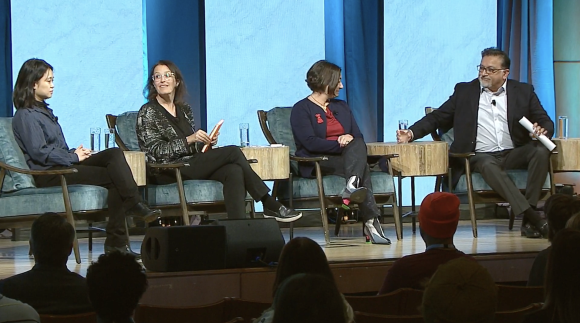
Ying Chen, Kelly Gallagher, Mercedes Pérez and Kishore Rao seated for a panel on Sunday, Dec. 4, 2022. (Courtesy of the University of Colorado Boulder)
Community members gathered on Sunday, Dec. 4 to hear from a panel about equitable ways to finance climate change initiatives.
The panel “Economics, pricing, policy: How do governments and various stakeholders pay and otherwise take action to develop climate policy solutions in a manner that is equitable?” discussed the economic factor of climate solutions.
Panelist Kelly Sims Gallagher, an academic dean and professor of energy and environmental policy at Tufts University, said that governments should allocate revenue from climate taxes and carbon offsetting to climate reparations, which pay for the loss and damage caused by the climate crisis.
“When a country like Pakistan — a less developed country — has a catastrophic event, they have to go and borrow more money to be able to recover from that disaster event,” Gallagher said. “This is becoming this vicious cycle for a lot of developing countries.”
Gallagher suggested this be done by suspending interest on the money these countries must borrow in the event of a climate disaster, such as the monsoons Pakistan experienced earlier this year.
Panelist Mercedes García Pérez, the head of global issues and innovation at the Delegation of the European Union to the U.S., suggested investing in moving workers out of jobs within the fossil fuel industry as a solution to the climate crisis.
“[There needs to be] massive investment to create new jobs in the renewable energy sector so that there are enough employment opportunities for people to transfer out of the fossil fuel industry,” Pérez said.
Many of these new jobs are not in the same location, which makes it harder for workers who are already skeptical of change to transfer out of their old jobs, according to Pérez.
“The way to bring them to the table is saying, ‘Ok, this [current job] might be the job for you, but it’s not a future for your children and your grandchildren,’” Pérez said.
Another issue presented with this solution is the inequity of financing such programs, as countries in the global south often do not have the resources or money to facilitate this switch.
Panelist Ying Chen, an author and assistant professor of economics at The New School, said this inequality must be addressed first before economic solutions are considered.
“If you don’t address the preexisting inequality, then even with a renewable energy transition, all the other inequality will still persist,” Chen said.
Chen said changing the political climate is more important than thinking about solutions because, without the right political climate, these solutions cannot be implemented.
“Climate activism is so important. We shouldn’t just leave things to the experts and trust that they will solve it all,” Chen said. “It’s very encouraging to see that the young generation is actively participating in the climate movement. I think it’s going to make a great impact.”
Using Indigenous knowledge
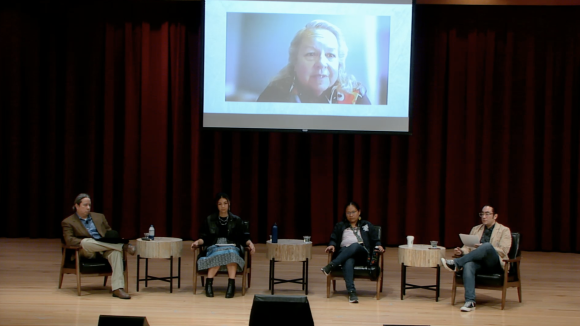
Moderator Tristan Ahtone and panelists Michael Kotutwa Johnson, Tia Kennedy, Cristina Coc and Robin Wall Kimmerer (on screen) discuss indigenous knowledge at the summit on Sunday, Dec. 4, 2022. (Courtesy of the University of Colorado Boulder)
Indigenous panelists spoke about how to properly use Indigenous knowledge as a climate solution in the panel “Traditional knowledge and climate solutions” on Sunday, Dec. 3.
Panelist Robin Wall Kimmerer, a member of the Citizen Potawatomi Nation and the author of CU Boulder’s 2022 Buffs One Read pick “Braiding Sweetgrass: Indigenous Wisdom, Scientific Knowledge and the Teachings of Plants,” said those considering climate solutions which include Indigenous knowledge need to be careful about how they do so.
“There is a tendency of data mining of traditional knowledge, taking the pieces that fit a western conception but not fully engaging with [an] Indigenous world view, philosophy and values,” Kimmerer said.
These Indigenous values are what make practices — like more sustainable agriculture — complete, according to panelists.
“If you just take our knowledge for what it is and you don’t take the values, the interconnectedness and the relationships that come with that you are missing the whole point,” said panelist Cristina Coc, a program director, organizer and co-spokesperson for the Maya Leaders Alliance.
Coc said that by taking and using Indigenous knowledge without considering those values, Indigenous people will continue to be silenced.
“Mining our knowledge is a way to make us invisible. Doing so without taking into account our value systems is a way to make us invisible,” Coc said.
Indigenous knowledge is sacred to Indigenous people, according to Coc, and it should not all be shared to create climate solutions.
“The protection of culturally specific knowledge is really important and the sharing of that knowledge needs to be in the hands of our people,” Kimmerer said.
Coc also focused on the importance of Indigenous people making decisions about how their knowledge is shared and in what way it is used.
She said part of the issue lies in that Indigenous people are not in the “decision-making seat” when it comes to how to share their knowledge or how their knowledge is used for solutions.
“When you’re asking about our traditional knowledge, you’re not saying ‘Come sit with me at the table so we can make decisions together,’ you’re saying ‘Tell me what you know so I can use it,’” Coc said. “You have to shift that power imbalance.”
Contact CU Independent Staff Writer Ann Marie Vanderveen at anva3588@colorado.edu.
Contact CU Independent Staff Writer Jessi Sachs at jessi.sachs@colorado.edu.
Contact CU Independent Breaking News Editor Celia Frazier at celia.frazier@colorado.edu.
